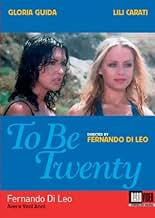CALIFICACIÓN DE IMDb
5.8/10
1.3 k
TU CALIFICACIÓN
Lia y Tina, buscando aventuras en Roma, terminan en situaciones peligrosas de prostitución y confrontación con la policía tras un plan que no sale como esperaban.Lia y Tina, buscando aventuras en Roma, terminan en situaciones peligrosas de prostitución y confrontación con la policía tras un plan que no sale como esperaban.Lia y Tina, buscando aventuras en Roma, terminan en situaciones peligrosas de prostitución y confrontación con la policía tras un plan que no sale como esperaban.
Carmelo Reale
- Head of rapists
- (as Roberto Reale)
Raul Lovecchio
- Vice-commissioner
- (as Raoul Lo Vecchio)
Salvatore Billa
- Delinquente in Bar
- (sin créditos)
Angelo Boscariol
- Cliente in trattoria
- (sin créditos)
Opiniones destacadas
In Fernando Di Leo's 1978 crime drama "Avere vent'anni" (English: "To Be Twenty"), the director takes viewers on a gritty and unflinching exploration of Italy's criminal underworld. Set against the backdrop of Rome's seedy underbelly, the film follows the intertwining stories of two young women, Gloria (Gloria Guida) and Liliana (Lili Carati), as they navigate the treacherous world of prostitution, drugs, and exploitation.
Di Leo's directorial approach is both raw and unapologetic, pulling no punches in its portrayal of the harsh realities faced by the film's protagonists. The gritty cinematography and naturalistic acting style lend an air of authenticity to the proceedings, immersing the audience in the sordid world depicted on screen.
Gloria Guida's performance as the naive and vulnerable Gloria is a standout, capturing the character's descent into a life of desperation and exploitation with heartbreaking realism. Lili Carati, on the other hand, brings a sense of world-weariness to her portrayal of Liliana, a seasoned sex worker who has become hardened by the brutal realities of her profession.
While the film's subject matter is undoubtedly challenging and at times uncomfortable, Di Leo handles it with a deft touch, avoiding sensationalism and instead offering a nuanced and empathetic portrayal of the characters' struggles. The director's unflinching lens exposes the harsh truths of a society that often turns a blind eye to the exploitation of its most vulnerable members.
However, "Avere vent'anni" is not without its flaws. The pacing can feel uneven at times, and some of the narrative threads feel underdeveloped or left dangling. Additionally, the film's relentless bleakness can be a bit overwhelming, leaving little room for moments of levity or respite.
Despite its shortcomings, "Avere vent'anni" remains a powerful and thought-provoking exploration of the darker corners of Italian society. Di Leo's masterful direction, combined with the standout performances of Gloria Guida and Lili Carati, make this a film that lingers in the mind long after the credits roll.
Di Leo's directorial approach is both raw and unapologetic, pulling no punches in its portrayal of the harsh realities faced by the film's protagonists. The gritty cinematography and naturalistic acting style lend an air of authenticity to the proceedings, immersing the audience in the sordid world depicted on screen.
Gloria Guida's performance as the naive and vulnerable Gloria is a standout, capturing the character's descent into a life of desperation and exploitation with heartbreaking realism. Lili Carati, on the other hand, brings a sense of world-weariness to her portrayal of Liliana, a seasoned sex worker who has become hardened by the brutal realities of her profession.
While the film's subject matter is undoubtedly challenging and at times uncomfortable, Di Leo handles it with a deft touch, avoiding sensationalism and instead offering a nuanced and empathetic portrayal of the characters' struggles. The director's unflinching lens exposes the harsh truths of a society that often turns a blind eye to the exploitation of its most vulnerable members.
However, "Avere vent'anni" is not without its flaws. The pacing can feel uneven at times, and some of the narrative threads feel underdeveloped or left dangling. Additionally, the film's relentless bleakness can be a bit overwhelming, leaving little room for moments of levity or respite.
Despite its shortcomings, "Avere vent'anni" remains a powerful and thought-provoking exploration of the darker corners of Italian society. Di Leo's masterful direction, combined with the standout performances of Gloria Guida and Lili Carati, make this a film that lingers in the mind long after the credits roll.
Applying a simplistic, hypocritical morality to this sleazy tale, the filmmaker (Fernando di Leo) gets to have it both ways. His camera captures every lurid detail of multiple sex scenes and takes every opportunity to savor the fine flesh of the tasty leads (Gloria Guida and Lilli Carati). He then condemns the women for being "sluts" and brutally reprimands them for their behavior.
"To Be Twenty" is a highly watchable story about two twenty-year-old free spirits whose youth and naivety bring on their destruction. Ninety per cent of the film graphically depicts the girls in a series of wild and frivolous adventures. Staples of 70's cinema such as drugs, politics, the generation gap, communal living and free sex are thrown into a mix to produce an enjoyable cinematic cocktail that captures the ennui of the period.
The film's surprising last stanza sounds a mean-spirited warning to women who freely advertise their sexuality without any intention of providing it. It is a nihilistic, barbaric, angry scene of human carnage that echoes the darkest aspects of "Last House on the Left", "Straw Dogs" and "I Spit On Your Grave".
A recurring song is used to potent effect over the end credits and the lead characters are brought to vivid life by the talented Guida and Carati.
Recommended.
"To Be Twenty" is a highly watchable story about two twenty-year-old free spirits whose youth and naivety bring on their destruction. Ninety per cent of the film graphically depicts the girls in a series of wild and frivolous adventures. Staples of 70's cinema such as drugs, politics, the generation gap, communal living and free sex are thrown into a mix to produce an enjoyable cinematic cocktail that captures the ennui of the period.
The film's surprising last stanza sounds a mean-spirited warning to women who freely advertise their sexuality without any intention of providing it. It is a nihilistic, barbaric, angry scene of human carnage that echoes the darkest aspects of "Last House on the Left", "Straw Dogs" and "I Spit On Your Grave".
A recurring song is used to potent effect over the end credits and the lead characters are brought to vivid life by the talented Guida and Carati.
Recommended.
In his 1978 film "Avere vent'anni" (To Be Twenty), director Fernando Di Leo attempts to capture the essence of youth, rebellion, and the complexities of growing up during a tumultuous era in Italy. Starring Gloria Guida and Lili Carati as two young women embarking on a journey of self-discovery, the film offers an intriguing blend of drama, comedy, and social commentary. However, despite its promising premise and some noteworthy performances, the movie ultimately falls short of delivering a truly memorable experience.
The film follows Lia (Gloria Guida) and Tina (Lili Carati) as they escape their restrictive lives in search of freedom and adventure. Their journey takes them from the countryside to the bustling city, where they encounter a variety of characters and situations that challenge their beliefs and force them to confront their own naivety. As they navigate their way through this new world, they must also grapple with issues such as sexuality, politics, and the ever-present threat of violence.
One of the film's strongest aspects is its depiction of the social and political climate of 1970s Italy. Di Leo does an excellent job of capturing the tension and unrest that permeated the country during this time, as well as the sense of disillusionment felt by many young people. The film's exploration of these themes adds a layer of depth and relevance that elevates it above a simple coming-of-age tale.
Another highlight of "Avere vent'anni" is the chemistry between Gloria Guida and Lili Carati. Their performances as Lia and Tina are both engaging and believable, effectively conveying the sense of excitement, confusion, and trepidation that comes with being on the cusp of adulthood. The bond between their characters is palpable, and their friendship serves as the emotional core of the film.
However, despite these strengths, "Avere vent'anni" suffers from a number of flaws that prevent it from reaching its full potential. One of the most glaring issues is the film's uneven tone, which oscillates between serious drama and slapstick comedy without ever finding a satisfying balance. This inconsistency can be jarring at times, and it often undermines the emotional impact of certain scenes.
Additionally, the movie's pacing can be sluggish, with some sequences feeling overly drawn out and others rushing through important plot points. This unevenness makes it difficult to fully invest in the story or the characters, and it contributes to a sense of disjointedness that permeates the film.
In conclusion, "Avere vent'anni" is a film with both commendable qualities and significant flaws. While its exploration of 1970s Italian society and the performances of Gloria Guida and Lili Carati are certainly noteworthy, the movie's uneven tone and pacing issues ultimately detract from its overall impact. Despite these shortcomings, however, the film remains an intriguing, if flawed, examination of youth, rebellion, and the search for identity during a tumultuous period in history.
The film follows Lia (Gloria Guida) and Tina (Lili Carati) as they escape their restrictive lives in search of freedom and adventure. Their journey takes them from the countryside to the bustling city, where they encounter a variety of characters and situations that challenge their beliefs and force them to confront their own naivety. As they navigate their way through this new world, they must also grapple with issues such as sexuality, politics, and the ever-present threat of violence.
One of the film's strongest aspects is its depiction of the social and political climate of 1970s Italy. Di Leo does an excellent job of capturing the tension and unrest that permeated the country during this time, as well as the sense of disillusionment felt by many young people. The film's exploration of these themes adds a layer of depth and relevance that elevates it above a simple coming-of-age tale.
Another highlight of "Avere vent'anni" is the chemistry between Gloria Guida and Lili Carati. Their performances as Lia and Tina are both engaging and believable, effectively conveying the sense of excitement, confusion, and trepidation that comes with being on the cusp of adulthood. The bond between their characters is palpable, and their friendship serves as the emotional core of the film.
However, despite these strengths, "Avere vent'anni" suffers from a number of flaws that prevent it from reaching its full potential. One of the most glaring issues is the film's uneven tone, which oscillates between serious drama and slapstick comedy without ever finding a satisfying balance. This inconsistency can be jarring at times, and it often undermines the emotional impact of certain scenes.
Additionally, the movie's pacing can be sluggish, with some sequences feeling overly drawn out and others rushing through important plot points. This unevenness makes it difficult to fully invest in the story or the characters, and it contributes to a sense of disjointedness that permeates the film.
In conclusion, "Avere vent'anni" is a film with both commendable qualities and significant flaws. While its exploration of 1970s Italian society and the performances of Gloria Guida and Lili Carati are certainly noteworthy, the movie's uneven tone and pacing issues ultimately detract from its overall impact. Despite these shortcomings, however, the film remains an intriguing, if flawed, examination of youth, rebellion, and the search for identity during a tumultuous period in history.
Fernando Di Leo is a director that gets a lot of criticism; and most of it is unfair in my opinion as he's directed a lot of the best Italian crime movies of the seventies, as well as some other curious gems. To Be Twenty is something of a departure from his crime films and doesn't really fit into any of the main genre headings that were popular in seventies Italy; although at a stretch it could be described as a cross between a sex comedy and an exploitation flick. The film is slightly misguided and that is its main problem as on the one hand it's light and breezy, and on the other hand it actually tries to make some points...with mixed results. The plot focuses on two young girls who are both young, hot and angry that meet on a beach. They set off to hitch a lift together and so begins an odyssey as the pair try to create an existence for themselves in a world overridden with sex, perverts and drugs. They manage to find a place to stay but not everything goes to plan and before long, the girls find themselves living a nightmare.
The tone of the movie is one of the best things about it as the director excellently captures the hippy-style care free atmosphere through the two young girls. The film stars Gloria Guida and Lilli Carati; both of whom serve the movie well in the looks department, especially when their clothes come off, but don't exactly set the film on fire with great acting. However, luckily this is a film that doesn't need great acting to succeed. The plot flows well and the two girls provide likable characters that make the film fun to watch. It's not exactly plot heavy and the film basically follows the girls on their unplanned journey right up until we come to the tragic ending. The ending is actually rather strange as it doesn't fit the tone of the movie and actually looks more like something straight out of a roughie film. However, it is rather powerful and won't be forgotten in a hurry; and the reason for that is mostly down to the way we are made to like the characters throughout the film. Overall, this film probably won't be for everyone's taste; but if you like this sort of stuff, you could do worse.
The tone of the movie is one of the best things about it as the director excellently captures the hippy-style care free atmosphere through the two young girls. The film stars Gloria Guida and Lilli Carati; both of whom serve the movie well in the looks department, especially when their clothes come off, but don't exactly set the film on fire with great acting. However, luckily this is a film that doesn't need great acting to succeed. The plot flows well and the two girls provide likable characters that make the film fun to watch. It's not exactly plot heavy and the film basically follows the girls on their unplanned journey right up until we come to the tragic ending. The ending is actually rather strange as it doesn't fit the tone of the movie and actually looks more like something straight out of a roughie film. However, it is rather powerful and won't be forgotten in a hurry; and the reason for that is mostly down to the way we are made to like the characters throughout the film. Overall, this film probably won't be for everyone's taste; but if you like this sort of stuff, you could do worse.
I have seen a shortened cut of "Avere Vent'Anni" but now I've watched the full-length version twice and there's a lot more to this film than some people seem to think. Fun is poked at bourgeois society, at self-important males doing jobs they think are important (store detectives, police inspectors), at a rich lesbian, at transcendental meditation, in short at many facets of seventies' life in Italy. Even the two female leads come in for their share. The ending can be seen as having nothing to do with the story, but I think there's more to it: while the girls just flit through life taking nothing seriously except having a good time, lurking at almost every corner is the reality of corrupt policemen and unscrupulous gangsters - the nasty side of the real world ... and in the end that will be their downfall.
¿Sabías que…?
- TriviaNamed #8 on the list of 10 Best Sexploitation Movies of All Time by website TheCinemaholic in 2017.
- Versiones alternativasThe movie was re-cut shortly after the Italian release. The 81-minute version omits the opening scene on the beach, the sequence featuring explicit lesbian sex between the two main characters, and the violent ending.
- Bandas sonorasAvere vent'anni
Written by Silvano Spadaccino (as Spadacino), Fernando Di Leo (as Di Leo)
Sung by Gloria Guida
Selecciones populares
Inicia sesión para calificar y agrega a la lista de videos para obtener recomendaciones personalizadas
- How long is To Be Twenty?Con tecnología de Alexa
Detalles
- Tiempo de ejecución1 hora 34 minutos
- Mezcla de sonido
- Relación de aspecto
- 1.85 : 1
Contribuir a esta página
Sugiere una edición o agrega el contenido que falta

Principales brechas de datos
By what name was Avere vent'anni (1978) officially released in India in English?
Responda



























